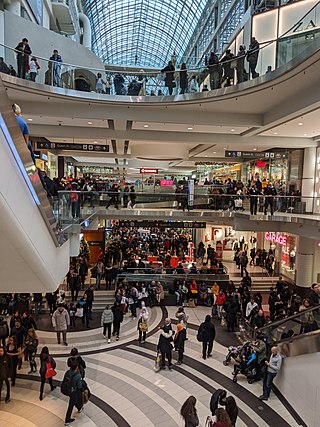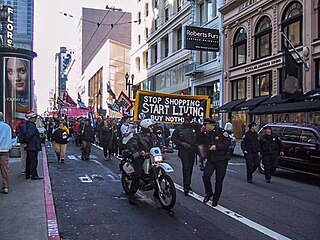Related Research Articles

Boxing Day is a holiday celebrated after Christmas Day, occurring on the second day of Christmastide. Boxing Day was once a day to donate gifts to those in need, but it has evolved to become a part of Christmas festivities, with many people choosing to shop for deals on Boxing Day. It originated in the United Kingdom and is celebrated in several Commonwealth nations. The attached bank holiday or public holiday may take place on 28 December if necessary to ensure it falls on a weekday. Boxing Day is also concurrent with the Christian festival Saint Stephen's Day.

Buy Nothing Day is a day of protest against consumerism. In North America, the United Kingdom, Finland and Sweden, Buy Nothing Day is held the day after U.S. Thanksgiving, concurrent with Black Friday; elsewhere, it is held the following day, which is the last Saturday in November.

Black Friday is the Friday after Thanksgiving in the United States. It traditionally marks the start of the Christmas shopping season in the United States. Many stores offer highly promoted sales at discounted prices and often open early, sometimes as early as midnight or even on Thanksgiving. Some stores' sales continue to Monday or for a week.

In the United States, public holidays are set by federal, state, and local governments and are often observed by closing government offices or giving government employees paid time off. The federal government does not require any private business to close or offer paid time off, as is the case for most state local governments, so employers determine which holidays to observe.
Cyber Monday is a marketing term for e-commerce transactions on the Monday after Thanksgiving in the United States. It was created by retailers to encourage people to shop online. The term was coined by Ellen Davis of the National Retail Federation and Scott Silverman, and made its debut on November 28, 2005, in a Shop.org press release entitled "Cyber Monday Quickly Becoming One of the Biggest Online Shopping Days of the Year". Cyber Monday takes place the Monday after Thanksgiving; the date falls between November 26 and December 2, depending on the year.

Christmas creep is a merchandising phenomenon in which merchants and retailers introduce Christmas-themed merchandise or decorations before the traditional start of the holiday shopping season, which in the United States is on the day after Thanksgiving. The term was first used in the mid-1980s.
Green Monday is an online retail industry term similar to Cyber Monday. The term was coined by Shopping.com, an eBay company, in 2007 to describe the best eCommerce sales day in December, usually the second Monday of December. After doing some internal research, they realized that the second Monday in December was the last day that shoppers were able to place an online order that would arrive in time for the holidays. Green Monday is defined more specifically by business research organization comScore as the last Monday with at least 10 days prior to Christmas.

The Christmas season or the festive season; also known as the holiday season or the holidays, is an annual period generally spanning from late November to early January. Incorporating Christmas Day and New Year's Day, the various celebrations during this time create a peak season for the retail sector extending to the end of the period. Christmas window displays and Christmas tree lighting ceremonies are customary traditions in various locales.
In retail, a doorbuster or door crasher deal is an offer that is handed out early into the business's opening hours; this offer almost always is promoting a good in limited supply. These deals are designed to attract large numbers of shoppers into the business.
Super Saturday or Panic Saturday is the last Saturday before Christmas or Christmas Eve, and is a major day of revenue for American retailers, marking the end of the shopping season which begins on Black Friday. Super Saturday targets last-minute shoppers. Typically the day is ridden with one-day sales in an effort to accrue more revenue than any other day in the Christmas and holiday season. The date is slightly more likely to fall on December 22, 19, or 17, than on December 21 or 20 (57), and slightly less likely to occur on December 23 or 18 (56). On years when Christmas falls on a Sunday, Super Saturday is officially on December 17 instead of December 24 even though the last Saturday before Christmas is December 24.
Cyber Black Friday is a marketing term for the online version of Black Friday, the day after Thanksgiving Day in the United States. The term made its debut in a 2009 press release entitled "Black Friday Goes Online for Cyber Black Friday". According to TechCrunch, there was $9 billion in online sales on Cyber Black Friday, which is up 21.6% from 2019. With this, the average cart-size for a shopper was $95.60, and Shopify noted that there was an average of $6.3 million spent per minute across their more than one million merchant platform. A lot of this spending was directed towards technological devices, primarily smart phones. Of the $9 billion is sales, $3.6 billion (40%) was for smart phones. However, Cyber Black Friday is still inferior to its sister, Cyber Monday. Cyber Monday is primarily known to offer more discounted items, and is projected to reach sales between $11.2 billion and $13 billion in 2020. On a more promising no†e, Gian Fulgoni of comScore said, "Black Friday, better known as a shopping bonanza in brick-and-mortar retail stores, is increasingly becoming one of the landmark days in the online holiday shopping world." Some Cyber Black Friday sales are short-lived, last through the weekend, into Cyber Monday, and beyond.

Small Business Saturday is a marketing initiative created and promoted by American Express to encourage holiday shopping on the Saturday after Thanksgiving in the United States, during one of the busiest shopping periods of the year. This Saturday is always the last one in November, so it falls between November 24 and November 30.
India has an Internet user base of about 690.0 million as of November 2023, about 40% of the population. Despite being the second-largest user base in world, only behind China, the penetration of e-commerce is low compared to markets like the United States, or France, but is growing, adding around 6 million new entrants every month. The industry consensus is that growth is at an inflection point.
Click Frenzy is an Australian e-commerce website and online sales initiative inspired by and based on a similar format to the United States shopping event Cyber Monday. Click Frenzy was founded by parent company Global Marketplace in 2012, and as of 2021 consists of a number of sales held throughout the year.
The Great Online Shopping Festival (GOSF) was an online shopping event created by Google India on 12 December 2012 in collaboration with a number of Indian online shopping portals. The concept of the GOSF was that the online shopping sites would give heavy discounts for one day, in order to promote their sales. In November 2015, Google announced that the event would not be repeated.

The economics of Christmas are significant because Christmas is typically a high-volume selling season for goods suppliers around the world. Sales increase dramatically as people purchase gifts, decorations, and supplies to celebrate. In the U.S., the "Christmas shopping season" starts as early as October. In Canada, merchants begin advertising campaigns just before Halloween, and step up their marketing following Remembrance Day on 11 November. In the UK and Ireland, the Christmas shopping season starts from mid-November, around the time when high street Christmas lights are turned on. In the United States, it has been calculated that about one fifth of retail sales to one quarter of all personal spending takes place during the Christmas/holiday shopping season. Figures from the U.S. Census Bureau reveal that expenditure in department stores nationwide rose from $20.8 billion in November 2004 to $31.9 billion in December 2004, an increase of 54 percent. In other sectors, the pre-Christmas increase in spending was even greater, due to a November through December buying surge of 100% in bookstores and 170% in jewelry stores. In the same year employment in American retail stores rose from 1.6 million to 1.8 million in the two months leading up to Christmas. This means that while consumers might spend more during this season, they also are given increased employment opportunities as sales rise to meet the increased demand.
The Island Hopper is an airline route between Guam and Honolulu, Hawaii, via several small islands in the Federated States of Micronesia and the Marshall Islands. The route, currently operated by United and originally by Continental Micronesia, is the only scheduled service for many of the islands visited en route.

Affirm Holdings, Inc. is an American public company founded by PayPal co-founder Max Levchin in 2012. It is a fintech company with a buy now, pay later service for online and in-store shopping. Affirm leads the U.S. buy now, pay later sector, reporting over 18 million users and US$20.2 billion annual GMV as of 2023.

In the United States there are a number of observed holidays where employees receive paid time off. The labor force in the United States comprises about 62% of the general population. In the United States, 97% of the private sector businesses determine what days this sector of the population gets paid time off, according to a study by the Society for Human Resource Management. The following holidays are observed by the majority of US businesses with paid time off: New Year's Day, New Year's Eve, Memorial Day, Independence Day, Labor Day, Thanksgiving, the day after known as Black Friday, Christmas Eve and Christmas. There are also numerous holidays on the state and local level that are observed to varying degrees.
The Black Friday hoax is historical claim about the origin of the term "Black Friday." The term denotes the Friday after Thanksgiving in the United States, a day that traditionally marks the start of the Christmas shopping season.
References
- ↑ Ermey, Ryan (2023-11-24). "Deals to the Maldives, Paris and Palm Springs: How to take advantage of 'Travel Tuesday'". CNBC. Retrieved 2024-02-13.
- 1 2 Palma, Kristi. "Get these Logan Airport deals during Travel Deal Tuesday 2023". www.boston.com. Retrieved 2024-02-13.
- 1 2 "What is Travel Tuesday – and what are the best travel deals?". The Independent. 2023-11-28. Retrieved 2024-02-13.
- ↑ Unger, Carl. "Is Travel Tuesday the new Cyber Monday? What to know before booking a deal". USA TODAY. Retrieved 2024-02-13.
- ↑ Sablich, Justin (2018-11-15). "The Best Shopping Holiday for Travelers May Not Be Black Friday (but It's Close)". The New York Times. ISSN 0362-4331 . Retrieved 2024-02-13.
- ↑ Mautone, Kira (2023-11-21). "Travel expert details how to get the most out of 'Travel Tuesday' to maximize travel in 2024". Fox News. Retrieved 2024-02-13.